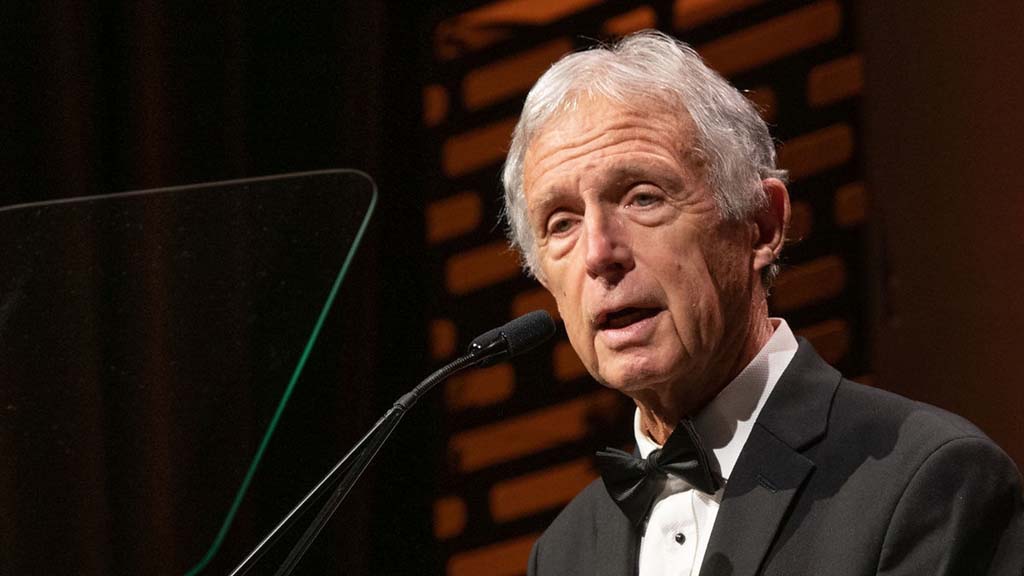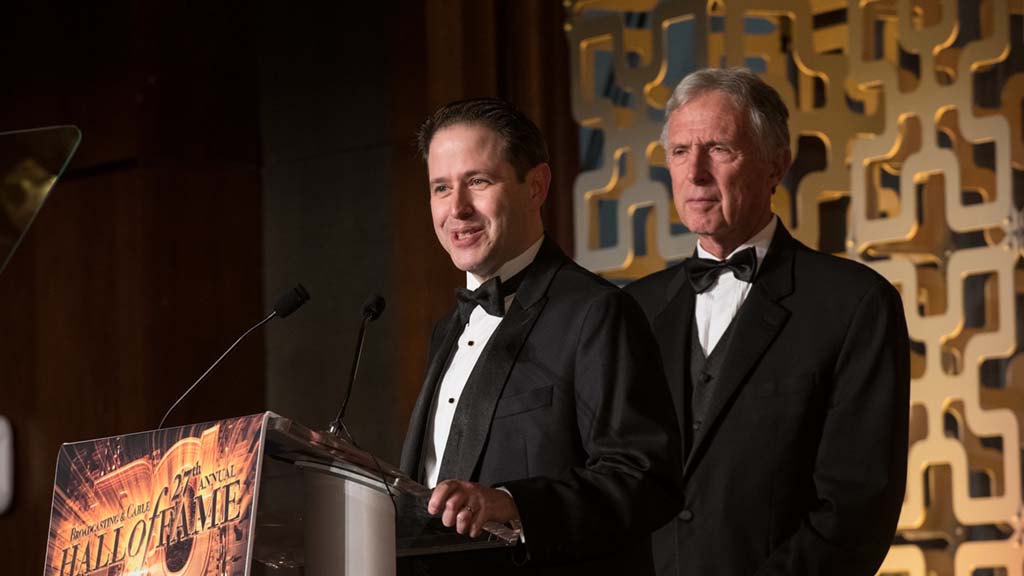Bill McGorry, Longtime ‘B+C’ Hall of Fame Chairman, Looks Back, Looks Ahead
Running Hall for 28 years, he’s had a unique perspective on the evolution of television

The smarter way to stay on top of broadcasting and cable industry. Sign up below
You are now subscribed
Your newsletter sign-up was successful
When the annual Broadcasting+Cable Hall of Fame event happens at the Ziegfeld Ballroom in New York September 26, it will be the final one for Bill McGorry, chairman of the Hall of Fame, in that role. McGorry, who has run the Hall of Fame since 1996, moves into a chairman emeritus role after the 2024 event, with Charlie Weiss, former VP and publisher, Broadcasting+Cable and Multichannel News, elevating up to Hall chairman.
The 2024 Hall of Fame honorees include Janice Arouh of Allen Media Group; Bob Bakish, formerly of Paramount Global; Philip R. Beuth, formerly of Capital Cities/ABC TV; Valari Dobson Staab of NBCUniversal Local; Karen Dougherty Buchholz of Comcast Corporation; Mario J. Gabelli of Gabelli Funds; Marianne Gambelli of Fox Corporation; Scott Herman of the Broadcasters Foundation of America; Douglas V. Holloway of Homewood Media; Steve Lanzano of TVB; Debra OConnell of Disney Entertainment Television; George Stephanopoulos of ABC News; and Arthur Wagner of Active International.
McGorry will also be inducted to note his significant contribution to the B+C Hall of Fame and the television industry in America.
McGorry spoke with Michael Malone, content director, B+C and Multichannel News, about how the Hall came to be, his best memories of it over the years, and what’s in store for the 2024 gala.
B+C: Tell me how the Hall of Fame first took shape
Bill McGorry: The Hall of Fame was launched in 1991. I actually competed with Broadcasting magazine. I had Multichannel News and the cable trades, Cablevision and CED [Cable Engineering Digest]. Broadcasting was the voice of that industry since 1931, so on their 60th anniversary, they decided to launch the Hall of Fame.
The very first class, they decided they would induct 60 honorees going all the way back to [radio inventor Guglielmo] Marconi. Only two were women — Lucille Ball and [Sesame Street originator] Joan Ganz Cooney. That was something that needed to be addressed.
The smarter way to stay on top of broadcasting and cable industry. Sign up below
Broadcasting publisher Don West felt the Hall of Fame should have a charitable component, so since day one, 1991, the Broadcasters Foundation of America, which helps radio and television professionals recovering from medical issues, disasters and accidents, was recognized as the primary beneficiary of the Hall of Fame, and remains so today.
The Paley Center For Media is a beneficiary as well.
In 1996, we were acquired by Cahners Publishing, and Cahners owned Broadcasting+Cable, which quite honestly was a big B, small c. They decided that I should get cable on somewhat equal footing with broadcasting. With my 20-25 years on the cable side, I had access to people that I felt should be in the Broadcasting+Cable Hall of Fame. So I made a commitment at that point. We definitely needed to have more women in the Hall of Fame. We needed minority representation. And I don't say that as a reflection on the people before me. It was truly the way the business had elevated along the way.
B+C: How does it feel for you to be inducted into the Hall, which you have had such a key role in building?
McGorry: The first thought that came to mind for me was a famous quote from Groucho Marx, about not wanting to be a member of a club that would have me!
Honestly, I hadn't planned this, but the circumstances were such that I felt it was time to step down. It is my 40th year in the television arena. It's been quite a ride, I have to say.

B+C: Charlie Weiss is moving up to chairman of the Hall of Fame when you shift to chairman emeritus. Tell me about Charlie and what he might bring to the Hall.
McGorry: Charlie’s ideally suited for a couple of reasons. He was publisher of B+C and Multichannel News for six years, he was a senior VP at NATPE for five years, and he’s a board member of the Broadcasters Foundation of America, the Hall’s major benefactor. He has deep contacts on the west coast, and has a good read on the evolution of the television business.
B+C: Do you have a favorite Hall of Fame memory from over the years?
McGorry: One of the most poignant ones for me was an appearance by Michael J. Fox at the 11th Hall of Fame ceremony. He at that time was already in some very difficult straits [due to Parkinson’s disease]. I sat behind him as he was at the podium, and he made some very gracious remarks about the industry and his evolution. I could observe what was going on with him, and it just stayed in my mind as one of the great memorable appearances.
This is a far less memorable moment, but the same year we inducted Michael J. Fox, I ended up hosting the event due to a last-minute host cancellation. The event was at the Marriott in New York. There were a couple of hundred people at the cocktail hour. I was looking for a handkerchief because I just found out I'm going to be the host. So I hopped on the escalator and went upstairs to get to the shop. I exited the escalator and it was dark. I came around the turn and hit my head on a big video screen, and split my forehead open.
And now I'm standing there in the dark without a handkerchief. My forehead is bleeding and I'm looking down at the gathering below me thinking, I've got to be down there in 15 minutes to kick this thing off.
A security guy saw me and said, oh, you're going to need stitches. I said, I can't. I have to go downstairs and host.
Anyhow, this guy gets a first-aid kit, gets the bleeding at least under control, and puts a big adhesive pad on my cut. And I go downstairs to kick it off.
B+C: What will your induction speech at this year’s event touch upon?
McGorry: I will mention Bill Daniels and his influence on my career.
My entry into the broadcast community was back in 1984. I became the publisher of Broadcast Management Engineering, and got a good look at the technology side of the industry. Three years in, they decided to sell BME and some other stuff, and I got an offer from Thomson to take on two of their publications in Denver on the cable side, Cablevision and CED, which at the time were in some distress. Multichannel News had taken a lot of the share, and it was a tough environment for the troops, but it gave me a chance to enter the cable business.
I went out to Denver to be introduced as the new publisher. On day two, the local sales guy said that he wanted me to accompany him over to Daniels Cablevision, which was a major supporter of Cablevision magazine. [Despite the similar names, Daniels Cablevision and Cablevision magazine did not have common ownership.]
I wound up going over there for a brief discussion with the ad director. After we’re chatting for about 15 minutes, he said to me, listen, the boss knows you're in the building, and he wants to meet you. So he took me upstairs, introduced me to [Daniels Cablevision founder] Bill Daniels, and Bill said, leave Bill with me here for a while, and I'll give you a shout when we're done.
I realized after we got in the discussion that I was in the company of a rather unique individual. Some people consider him the father of cable television.
He said to me, Bill, I want you to know that you're stepping into this situation because they need some support there. He said, this industry needs more than one voice. You've got to be sure that Cablevision and CED and whatever else you're doing supports us. I'll help you do whatever you feel you need to do.
Bill Daniels unfortunately passed away in 2000, but was probably the one guy that steered me and gave me the confidence we needed. He was a mentor and became almost like a family member.
Speaking of family members, my speech will also mention that my son and five daughters have each had a role in the broadcast or cable industry, which shows you the impact broadcast and cable has had on my life.
The 32nd Broadcasting+Cable Hall of Fame takes place on Thursday, September 26 at the Ziegfeld Ballroom. For sponsorship, tables and ticket information, please contact Jessica Wolin at jessica.wolin@futurenet.com. To visit the Hall of Fame website for more information, click here.
Michael Malone is content director at B+C and Multichannel News. He joined B+C in 2005 and has covered network programming, including entertainment, news and sports on broadcast, cable and streaming; and local broadcast television, including writing the "Local News Close-Up" market profiles. He also hosted the podcasts "Busted Pilot" and "Series Business." His journalism has also appeared in The New York Times, The L.A. Times, The Boston Globe and New York magazine.

